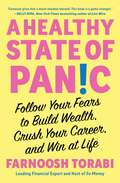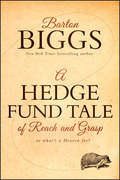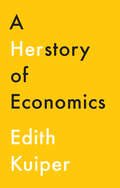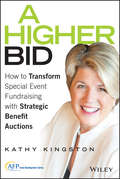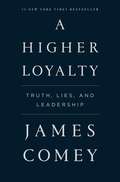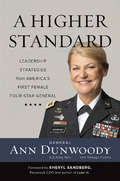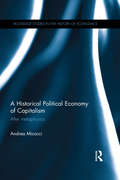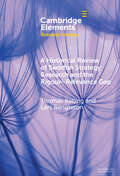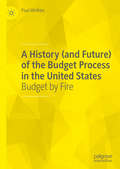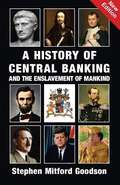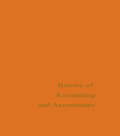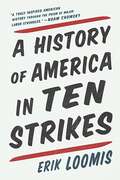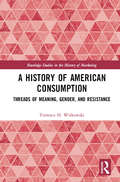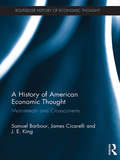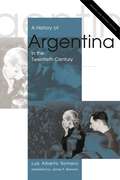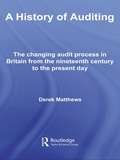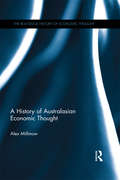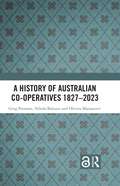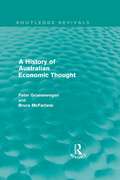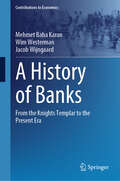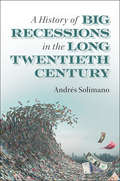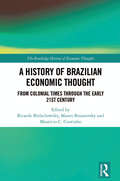- Table View
- List View
A Healthy State of Panic: Follow Your Fears to Build Wealth, Crush Your Career, and Win at Life
by Farnoosh TorabiNamed a Newsweek Best Book of 2023 From the creator of the popular finance podcast So Money, this accessible and clever guide to leaning into your fear to maximize your financial success and beyond &“is a game-changer&” (Kelly Ripa), perfect for fans of Buy Yourself the F*cking Lilies and You Are a Badass at Making Money.Farnoosh Torabi is familiar with fear. Growing up in the 1980s as the daughter of Iranian immigrants, she was warned to always play it safe. She spent her childhood immersed in fear—of rejection, loneliness, missed opportunities, and falling short of her potential. Of course, now her mother says, &“It all worked out, didn&’t it?&” Funnily enough, it did. Farnoosh came to the realization that fear never limited her. Instead, it has become a friend, opening her world and equipping her with the tools and street smarts to navigate life&’s trials and thrive on her own terms. Now, Farnoosh pairs stories from her immigrant upbringing with hard-won industry knowledge and data to show how leaning into your fears can help you take control of your financial future. With clear-eyed advice and an engaging, heartfelt voice, she lays out the nine most common fears that hold us back—both personally and in our financial decisions—and shows how these fears can be pivoted into strengths and mined for wisdom to help us achieve richer, more meaningful lives: 1. The Fear of Rejection and how it leads to self-discovery and where we are loved. 2. The Fear of Loneliness and how it promotes strength, resilience, and empathy. 3. The Fear of Missing Out and how it begs for self-reflection and promotes individuality and boundaries. 4. The Fear of Being Exposed and how it heightens awareness and draws comedy and connection. 5. The Fear of Uncertainty and how it accelerates our goals and finds order in the disorder. 6. The Fear of Money and how it encourages landing on your (true) money story and pursuing financial freedom. 7. The Fear of Failure and how it helps us to embrace red flags and the next right thing. 8. The Fear of Endings and how it sparks action, deepens an appreciation for what endures and unveils the beauty in regret. 9. The Fear of Losing Your Freedom and how it fuels self-advocacy and inspires a legacy. Discover how you can become more self-reliant and financially resilient, invite calm and control into your daily routine, and how fear can serve you with this &“wise, witty, and illustrative guide&” (Eve Rodsky, New York Times bestselling author) to building your best life.
A Hedge Fund Tale of Reach and Grasp: Or What's a Heaven For
by Barton BiggsFinancial legend Barton Biggs' fictional account of the hedge world and the broader workings of Wall Street Barton Biggs' latest book is an inspirational rags to riches story of drive and financial talent. Told through the eyes of a fictional insider, this engaging story provides a detailed look at the hedge fund business in the late 1990s and through the first decade of the twenty-first century. A Tale From the Hedge Fund World chronicles the life of a poor boy who ends up amassing more wealth than he ever thought possible. From studying Wall Street charts while sitting on the sidelines of football practice to realizing how so much money can be made in a short period of time, this book provides a bird's eye view of the inner workings of Wall Street and what it takes to make it there. Puts the word of hedge funds in perspective and reveals the competitive and lucrative nature of this field Other titles by Biggs: Hedgehogging and Wealth, War & Wisdom Also describes the bursting of the mortgage bubble and the great financial crisis that followed No one knows more about the hedge fund world of the past twenty years than Barton Biggs. His new fable offers an entertaining look at this field and those who aspire to excel within it.
A Herstory of Economics
by Edith KuiperThere were only a few women economists who made it to the surface and whose voices were heard in the history of economic thought of Adam Smith, David Ricardo, John Maynard Keynes, and Milton Friedman – right? Wrong! In this book, distinguished economist Edith Kuiper shows us that the history of economic thought is just that, a his-story, by telling the herstory of economic thought from the perspective of women economic writers and economists. Although some of these women were well known in their time, they were excluded from most of academic economics, and, over the past centuries, their work has been neglected, forgotten, and thus become invisible. Edith Kuiper introduces the reader to an amazing crowd of female pioneers and reveals how their insights are invaluable to understanding areas of economics ranging from production, work, and the economics of the household, to income and wealth distribution, consumption, public policy, and much more. This pathbreaking book presents a whole new perspective on the development of economic thought. It will be essential reading for all students and scholars of the history of economic thought and feminist economics.
A Higher Bid
by Kathy KingstonTransform fundraising events into long-term revenue with expert auction advice A Higher Bid is the nonprofit school and organization guide to planning and executing more exciting, more lucrative special event fundraisers. In this book, award-winning consultant, fundraiser, speaker, and professional auctioneer Kathy Kingston shares her proprietary and proven approaches to audience development, board empowerment, leadership succession, guest cultivation and engagement, and donor development. You'll learn how live auctions, special appeals, innovative icebreakers, silent auctions, and new technologies can help increase revenue, and how to execute these events in a way that translates to a stronger donor base for long-term giving. Kingston describes how to match the guest list and catalog for better results, and reveals the strategies professional auctioneers use to curate the right auction items and discover the right people to generate optimum revenue and engage donors. This book offers a fresh approach to fundraising, showing you how charity benefit auctions can be made a centerpiece of fundraising special events to drive both short- and long-term fundraising goals while providing a fun and inspiring opportunity to generate awareness and keep supporters excited about the mission. Using Kingston's proven framework, you'll learn effective ways to: Strategically increase high-profit revenue streams Increase your organization's donor base Empower the board toward efficiency and productivity Engage supporters more deeply and keep them invested Donors are the lifeblood of any nonprofit organization, and sustainable revenue depends upon their high engagement and willingness to give. Well-executed benefit and charity auctions have proven to be effective fundraisers for nonprofits, associations, and schools of all types, and A Higher Bid is the expert guide to optimizing these special events for maximum impact.
A Higher Loyalty: Truth, Lies, and Leadership
by James Comey<P>In his book, former FBI director James Comey shares his never-before-told experiences from some of the highest-stakes situations of his career in the past two decades of American government, exploring what good, ethical leadership looks like, and how it drives sound decisions. His journey provides an unprecedented entry into the corridors of power, and a remarkable lesson in what makes an effective leader. <P>Mr. Comey served as director of the FBI from 2013 to 2017, appointed to the post by President Barack Obama. He previously served as U.S. attorney for the Southern District of New York, and the U.S. deputy attorney general in the administration of President George W. Bush. From prosecuting the Mafia and Martha Stewart to helping change the Bush administration's policies on torture and electronic surveillance, overseeing the Hillary Clinton e-mail investigation as well as ties between the Trump campaign and Russia, Comey has been involved in some of the most consequential cases and policies of recent history.
A Higher Standard: Leadership Strategies from America's First Female Four-Star General
by Ann Dunwoody Tomago Collins Foreword by Sheryl SandbergOn June 23, 2008, President George W. Bush nominated Ann Dunwoody as a four-star general in the US Army--the first time a woman had ever achieved that rank. The news generated excitement around the world. Now retired after nearly four decades in the Army, Dunwoody shares what she learned along the way, from her first command leading 100 soldiers to her final assignment, in which she led a $60 billion enterprise of over 69,000 employees, including the Army's global supply chain in support of Iraq and Afghanistan. What was the driving force behind Dunwoody's success? While her talent as a logistician and her empathy in dealing with fellow soldiers helped her rise through the ranks, Dunwoody also realized that true leaders never stop learning, refining, growing, and adapting. In A Higher Standard, Dunwoody details her evolution as a soldier and reveals the core leadership principles that helped her achieve her historic appointment. Dunwoody's strategies are applicable to any leader, no matter the size or scope of the organization. They include lessons such as "Never Walk by a Mistake," a mandate to recognize when something is wrong, big or small, and to hold people accountable. Not only can this save billions for industry, it can sometimes save the lives of soldiers and citizens. She also advises that "Leaders Aren't Invincible--Don't Try to Be": to be our best, we have to acknowledge our worst. And she encourages readers to "Leverage the Power of Diversity" by creating teams of people from different backgrounds to provide a broad range of ideas and devise the best-informed decisions. With these and other guiding principles, A Higher Standard offers practical, tactical advice that everyone can use to lead and achieve with maximum success.
A Historical Political Economy of Capitalism: After metaphysics (Routledge Studies in the History of Economics)
by Andrea MicocciIn order to understand the resilience of capitalism as a mode of production, social organization, and an intellectual system, it is necessary to explore its intellectual development and underlying structure. A Historical Political Economy of Capitalism argues that capitalism is based on a dominant intellectuality: a metaphysics. It proposes the construction of a history-based 'critique of political economy', capable of revealing the poverty of capitalism's intellectual logic and of its application in practice. This involves a reconsideration of several classical thinkers, including Smith, Marx, Berkeley, Locke, Hobbes, Hume and Rousseau. It also sketches an emancipative methodology of analysis, aiming to expose any metaphysics, capitalist or none. In doing so, this book proposes a completely new approach in materialist philosophy. The new methodology in political economy that is proposed in this volume is an alternative way to organize a materialist approach. Some basic aspects of what is argued by the author can be found in Marx. This book is well suited for those who study political economy and economic theory and philosophy, as well as those who are interested in Marxism.
A Historical Review of Swedish Strategy Research and the Rigor-Relevance Gap (Elements in Business Strategy)
by Thomas Kalling Lars BengtssonThere are many explanations for the so-called rigor-relevance gap in academic research on strategic management. This Element reviews the existing literature on the matter and argues that it must go beyond the typical explanations of knowledge and language differences and look at more fundamental, societal, and cultural explanations. The empirical focus of this Element is the history and possible particularities of strategic management research in Sweden where the authors show how almost 300 years of relevance-centered research have undergone significant changes over the last 30 years, and that the historical development is based very much on societal pressure, academic culture and shifting perspectives on the role of academic research. The authors conclude by offering a couple of examples of how Swedish research, close to its traditional approaches, still can contribute to relevance and thus help balance the rigor-relevance divide.
A Historiography of the Modern Social Sciences
by Roger E. Backhouse Philippe FontaineA Historiography of the Modern Social Sciences includes essays on the ways in which the histories of psychology, anthropology, sociology, economics, history and political science have been written since the Second World War. Bringing together chapters written by the leading historians of each discipline, the book establishes significant parallels and contrasts and makes the case for a comparative interdisciplinary historiography. This comparative approach helps explain historiographical developments on the basis of factors specific to individual disciplines and the social, political, and intellectual developments that go beyond individual disciplines. All historians, including historians of the different social sciences, encounter literatures with which they are not familiar. This book will provide a broader understanding of the different ways in which the history of the social sciences, and by extension intellectual history, is written.
A History (and Future) of the Budget Process in the United States: Budget by Fire
by Paul WinfreeThe United States has one of the most unique budgeting processes of any modern government. The “powers of the purse” are enumerated under the Constitution, but they were hotly debated by the nation’s founding fathers. However, the lack of a legal guide for exactly how to delegate the powers, and under what conditions, has led to a process marked by power struggles—primarily between Congress and the presidency—over the last 230 years. Still, the budget and appropriations process is central to the functioning of the federal government. This book covers the transformation of American government through the lens of shifting budgeting power, while documenting the evolution of economic policy through the federal budget. As the nation and the federal government have expanded, the budget process has entirely broken down. This book also recommends changes that would help the budget process function more effectively. The chapters are organized both chronologically and topically to help the reader think through the evolution of the budget process. With its comprehensive approach to the history of the budget process—covering the entirety of US federal existence—this book will be a go-to resource for academics and public policy professionals interested in Congressional and executive history.
A History Of Central Banking And The Enslavement Of Mankind
by Stephen Mitford GoodsonA History of Central Banking and the Enslavement of Mankind is Stephen Mitford Goodson’s companion volume to Inside the South African Reserve Bank Its Origins and Secrets Exposed. While the latter volume describes the mechanics of the fraudulent usury banking system, with a focus on Goodson’s experiences as a director of the SA Reserve Bank, this volume expands the focus to encompass the role of banking and money in history from ancient times to the present. <p><p> The role of money-lenders in history was once aptly termed by many acute observers as the “Hidden Hand.” It is the power to create, lend and accumulate interest on “credit,” and then re-lend that interest for further interest, in perpetuity, that creates pervasive, worldwide debt, from the individual, to the family, to the entire state. The ability to operate a fraudulent credit and loan system has long been known, and through all the slickness of a snake-oil salesman, the money-lenders – the same types Jesus whipped from the Temple – have persuaded governments that banking is best left to private interests. <p> Many wars, revolutions, depressions, recessions, and other social upheavals, have been directly related to the determination of these money-lenders to retain and extend their power and profits. When any state, individual or idea has threatened their scam they have often responded with wars and revolutions. The cultural and material progress of a civilization will often relate to the degree by which it is free from the influence of debt, and the degradation that results when the money-lenders are permitted to regain power. Hence, Goodson shows that both World Wars, the Napoleonic wars, the American Revolution, the rise and fall of Julius Caesar, the overthrow of Qathafi in Libya and the revolution against Tsar Nicholas, among much else relate to this “Hidden Hand” in history. This is the key to understanding the past, present and future.
A History of Accounting and Accountants
by Richard BrownFirst published in 1968. Inspired by the occurrence of the Fiftieth Anniversary of the incorporation of Accountants in Scotland—in which country the Chartered Accountant first saw the light — suggested the propriety of writing an account of the origin and growth of the profession while it was still possible to ascertain the facts and describe the circumstances with some degree of fulness. This book also includes a history of Accounts, Auditing, and Book-keeping; in short, to treat of Accounting— as well as Accountants—from the historic standpoint.
A History of America in Ten Strikes (G - Reference,information And Interdisciplinary Subjects Ser.)
by Erik LoomisRecommended by The Nation, the New Republic, Current Affairs, Bustle, In These Times An "entertaining, tough-minded, and strenuously argued" The Nation account of ten moments when workers fought to change the balance of power in America "A brilliantly recounted American history through the prism of major labor struggles, with critically important lessons for those who seek a better future for working people and the world." -Noam Chomsky Powerful and accessible, A History of America in Ten Strikes challenges all of our contemporary assumptions around labor, unions, and American workers. In this brilliant book, labor historian Erik Loomis recounts ten critical workers' strikes in American labor history that everyone needs to know about and then provides an annotated list of the 150 most important moments in American labor history in the appendix . From the Lowell Mill Girls strike in the 1830s to Justice for Janitors in 1990, these labor uprisings do not just reflect the times in which they occurred, but speak directly to the present moment. For example, we often think that Lincoln ended slavery by proclaiming the slaves emancipated, but Loomis shows that they freed themselves during the Civil War by simply withdrawing their labor. He shows how the hopes and aspirations of a generation were made into demands at a GM plant in Lordstown in 1972. And he takes us to the forests of the Pacific Northwest in the early nineteenth century where the radical organizers known as the Wobblies made their biggest inroads against the power of bosses. But there were also moments when the movement was crushed by corporations and the government; Loomis helps us understand the present perilous condition of American workers and draws lessons from both the victories and defeats of the past. In crystalline narratives, labor historian Erik Loomis lifts the curtain on workers' struggles, giving us a fresh perspective on American history from the boots up. Strikes include: -Lowell Mill Girls Strike Massachusetts, 1830-40 - Slaves on Strike The Confederacy, 1861-65 -The Eight-Hour Day Strikes Chicago, 1886 -The Anthracite Strike Pennsylvania, 1902 -The Bread and Roses Strike Massachusetts, 1912 - The Flint Sit-Down Strike Michigan, 1937 -The Oakland General Strike California, 1946 -Lordstown Ohio, 1972 -Air Traffic Controllers 1981 -Justice for Janitors Los Angeles, 1990
A History of American Consumption: Threads of Meaning, Gender, and Resistance (Routledge Studies in the History of Marketing)
by Terrence H. WitkowskiThe United States has been near the forefront of global consumption trends since the 1700s, and for the past century and more, Americans have been the world’s foremost consuming people. Informed and inspired by the literature from consumer culture theory, as well as drawing from numerous studies in social and cultural history, A History of American Consumption tells the story of the American consumer experience from the colonial era to the present, in three cultural threads. These threads recount the assignment of meaning to possessions and consumption, the gendered ideology and allocation of consumption roles, and resistance through anti-consumption thought and action. Brief but scholarly, this book provides a thought provoking, introduction to the topic of American consumption history informed by research in consumer culture theory. By examining and explaining the core phenomenon of product consumption and its meaning in the changing lives of Americans over time, it provides a valuable contribution to the literature on the subjects of consumption and its causes and consequences. Readable and insightful, it will be of interest to scholars and advanced students in consumer behaviour, advertising, and marketing and business history.
A History of American Economic Thought: Mainstream and Crosscurrents (The Routledge History of Economic Thought)
by Samuel Barbour James Cicarelli J. E. KingThis vital addition to the Routledge History of Economic Thought series surveys arguably the most important country in the development of economics as we know it today – the United States of America. A History of American Economic Thought is a comprehensive study of American economics as it has evolved over time, with several singularly unique features including: a thorough examination of the economics of American aboriginals prior to 1492; a detailed discussion of American economics as it has developed during the last fifty years; and a generous dose of non-mainstream American economics under the rubrics "Other Voices" and "Crosscurrents." It is far from being a native American community, and numerous social reformers and those with alternative points of view are given as much weight as the established figures who dominate the mainstream of the profession. Generous doses of American economic history are presented where appropriate to give context to the story of American economics as it proceeds through the ages, from seventeenth-century pre-independence into the twentieth-first century packed full of influential figures including John Bates Clark, Thorstein Veblen, Irving Fisher, Paul Samuelson, and John Kenneth Galbraith, to name but a few. This volume has something for everyone interested in the history of economic thought, the nexus of American economic thought and American economic history, the fusion of American economics and philosophy, and the history of science.
A History of Argentina in the Twentieth Century: Updated and Revised Edition
by James P. Brennan Luis Alberto RomeroA History of Argentina in the Twentieth Century, originally published in Buenos Aires in 1994, attained instant status as a classic. Written as an introductory text for university students and the general public, it is a profound reflection on the “Argentine dilemma” and the challenges that the country faces as it tries to rebuild democracy. Luis Alberto Romero brilliantly and painstakingly reconstructs and analyzes Argentina’s tortuous, often tragic modern history, from the “alluvial society” born of mass immigration, to the dramatic years of Juan and Eva Perón, to the recent period of military dictatorship. For this second English-language edition, Romero has written new chapters covering the Kirchner decade (2003–13), the upheavals surrounding the country’s 2001 default on its foreign debt, and the tumultuous years that followed as Argentina sought to reestablish a role in the global economy while securing democratic governance and social peace.
A History of Argentina in the Twentieth Century: Updated and Revised Edition
by Luis Alberto RomeroA History of Argentina in the Twentieth Century, originally published in Buenos Aires in 1994, attained instant status as a classic. Written as an introductory text for university students and the general public, it is a profound reflection on the “Argentine dilemma” and the challenges that the country faces as it tries to rebuild democracy. Luis Alberto Romero brilliantly and painstakingly reconstructs and analyzes Argentina’s tortuous, often tragic modern history, from the “alluvial society” born of mass immigration, to the dramatic years of Juan and Eva Perón, to the recent period of military dictatorship. For this second English-language edition, Romero has written new chapters covering the Kirchner decade (2003–13), the upheavals surrounding the country’s 2001 default on its foreign debt, and the tumultuous years that followed as Argentina sought to reestablish a role in the global economy while securing democratic governance and social peace.
A History of Auditing: The Changing Audit Process in Britain from the Nineteenth Century to the Present Day (Routledge New Works in Accounting History #Vol. 5)
by Derek MatthewsThe rise of the British accountancy profession from the late nineteenth century to the present day, and the world-wide success of its accountancy firms, were to a large extent based on the growth of the audit function. This book explores the history of the audit process in Britain, demonstrating that the characteristic features of the auditing industry are a diversity in practice based largely on the different types of clients the auditors serve. The book examines the innovation that was brought about by the staggering developments in information technology which have been seen over the last few centuries. This comprehensive history will be a useful reference tool for accounting, business and economic historians and will also be an enlightening read for all those with an interest in auditing procedures.
A History of Australasian Economic Thought (The Routledge History of Economic Thought)
by Alex MillmowThis overview of Australasian economic thought presents the first analysis of the Australian economic contribution for 25 years, and is the first to offer a panoramic sweeping account of New Zealand economic thought. Those two countries, both at the start of the twentieth century and at its end, excelled at innovative economic practices and harbouring unique economic institutions. A History of Australasian Economic Thought explains how Australian and New Zealand economists exerted influence on economic thought and contributed to the economic life of their respective countries in the twentieth century. Besides surveying theorists and innovators, this book also considers some of the key expositors and builders of the academic economics profession in both countries. The book covers key economic events including the Great Depression, the Second World War, the post-war boom and the great inflation that overtook it and, lastly, the economic reform programmes that both Australia and New Zealand undertook in the 1980s. Through the interplay of economic events and economic thought, this book shows how Australasian economists influenced, to differing degrees, economic policy in their respective countries. This book is of great importance to those who are interested in and study the history of economic thought, economic theory and philosophy, and philosophy of social science, as well as Australasian economics.
A History of Australian Co-operatives 1827-2023
by Greg Patmore Nikola Balnave Olivera MarjanovicCo-operatives provide a different approach to organising business through their ideals of member ownership and democratic practice. Every co-operative member has an equal vote regardless of his or her own personal capital investment. They take a variety of different forms, including consumer co-operatives, agricultural co-operatives, worker co-operatives and financial co-operatives. Patmore, Balnave and Marjanovic provide a perspective on Australian co-operative development within a conceptual framework and international context since the 1820s by exploring the economic, political and social factors that explain their varying fortunes. Drawing upon the Visual Historical Atlas of Australian Co-operatives, a significant database of Australian co-operatives and a variety of historical sources, this book provides a detailed historical analysis of their development, from their inception in Australia to today. Australian co-operatives were heavily dependent on state sympathy for their growth and vulnerable to ideas that challenged collective organisation such as Neo-liberalism. Despite these challenges, the co-operative business model has persisted and since 2009, there has been resurgence of interest and organisation that may provide a platform for future growth. A useful resource for practitioners, students, educators, policy makers and researchers that highlights a significant alternative business model to the Investor-Owned Business and state enterprise.
A History of Australian Co-operatives 1827–2023
by Greg Patmore Nikola Balnave Olivera MarjanovicCo-operatives provide a different approach to organising business through their ideals of member ownership and democratic practice. Every co-operative member has an equal vote regardless of his or her own personal capital investment. They take a variety of different forms, including consumer co-operatives, agricultural co-operatives, worker co-operatives and financial co-operatives.Patmore, Balnave and Marjanovic provide a perspective on Australian co-operative development within a conceptual framework and international context since the 1820s by exploring the economic, political and social factors that explain their varying fortunes. Drawing upon the Visual Historical Atlas of Australian Co-operatives, a significant database of Australian co-operatives and a variety of historical sources, this book provides a detailed historical analysis of their development, from their inception in Australia to today. Australian co-operatives were heavily dependent on state sympathy for their growth and vulnerable to ideas that challenged collective organisation such as Neo-liberalism. Despite these challenges, the co-operative business model has persisted and since 2009, there has been resurgence of interest and organisation that may provide a platform for future growth.A useful resource for practitioners, students, educators, policy makers and researchers that highlights a significant alternative business model to the Investor-Owned Business and state enterprise.The Open Access version of this book, available at http://www.taylorfrancis.com, has been made available under a Creative Commons [Attribution-Non Commercial-No Derivatives (CC-BY-NC-ND)] 4.0 license.
A History of Australian Economic Thought (Routledge Revivals)
by Peter Groenewegen Bruce McFarlaneFirst published in 1990, this book presents an original and comprehensive overview of Australian economic thought. The authors stress, by way of introduction, the many important innovative contributions Australian economists have made to thought worldwide. As the argument develops, the work of major figures is discussed in detail in addition to the role of different journals and economic societies.
A History of Banks: From the Knights Templar to the Present Era (Contributions to Economics)
by Mehmet Baha Karan Wim Westerman Jacob WijngaardThis book provides an overview of monetary history from the perspectives of the financial intermediaries who shaped it. Starting from the Knights Templar and ending with contemporary national banking champions, it presents several case studies that demonstrate how banks from around the world have revolutionized both their operations and the markets they operate in. The text holds a plea for democratic and transnational financial intermediation systems. It appeals to students and scholars of economic history as well as to anyone interested in the history of banking and finance.
A History of Big Recessions in the Long Twentieth Century
by Andrés SolimanoThis book examines the array of financial crises, slumps, depressions and recessions that happened around the globe during the twentieth and early twenty-first centuries. It covers events including World War I, hyperinflation and market crashes in the 1920s, the Great Depression of the 1930s, stagflation of the 1970s, the Latin American debt crises of the 1980s, the post-socialist transitions in Central Eastern Europe and Russia in the 1990s, and the great financial crisis of 2008–09. In addition to providing wide geographic and historical coverage of episodes of crisis in North America, Europe, Latin America and Asia, the book clarifies basic concepts in the area of recession economics, analysis of high inflation, debt crises, political cycles and international political economy. An understanding of these concepts is needed to comprehend big recessions and slumps that often lead to both political change and the reassessment of prevailing economic paradigms.
A History of Brazilian Economic Thought: From colonial times through the early 21st century (The Routledge History of Economic Thought)
by Mauro Boianovsky Ricardo Bielschowsky Mauricio C. CoutinhoThis book provides a comprehensive analysis of the evolution of Brazilian economic thought ranging from colonial times through to the early 21st century. It explores the production of ideas on the Brazilian economy through various forms of publication and contemporary thoughts on economic contexts and development policies, all closely reflecting the evolution of economic history. After an editorial introduction, it opens with a discussion of the issue of the historical limits to and circumstances of the production of pure economic theory by Brazilian economists. The proceeding chapters follow the classical periodization of Brazilian economic history, starting with the colonial economy (up until the early 19th century) and the transition into an economy independent from Portugal (1808 through the 1830s) when formal independence took place in 1822. This book is ideal for international and national scholars in social sciences, students in both undergraduate and graduate courses in economics, and any individuals interested in Brazilian economic and intellectual history.
